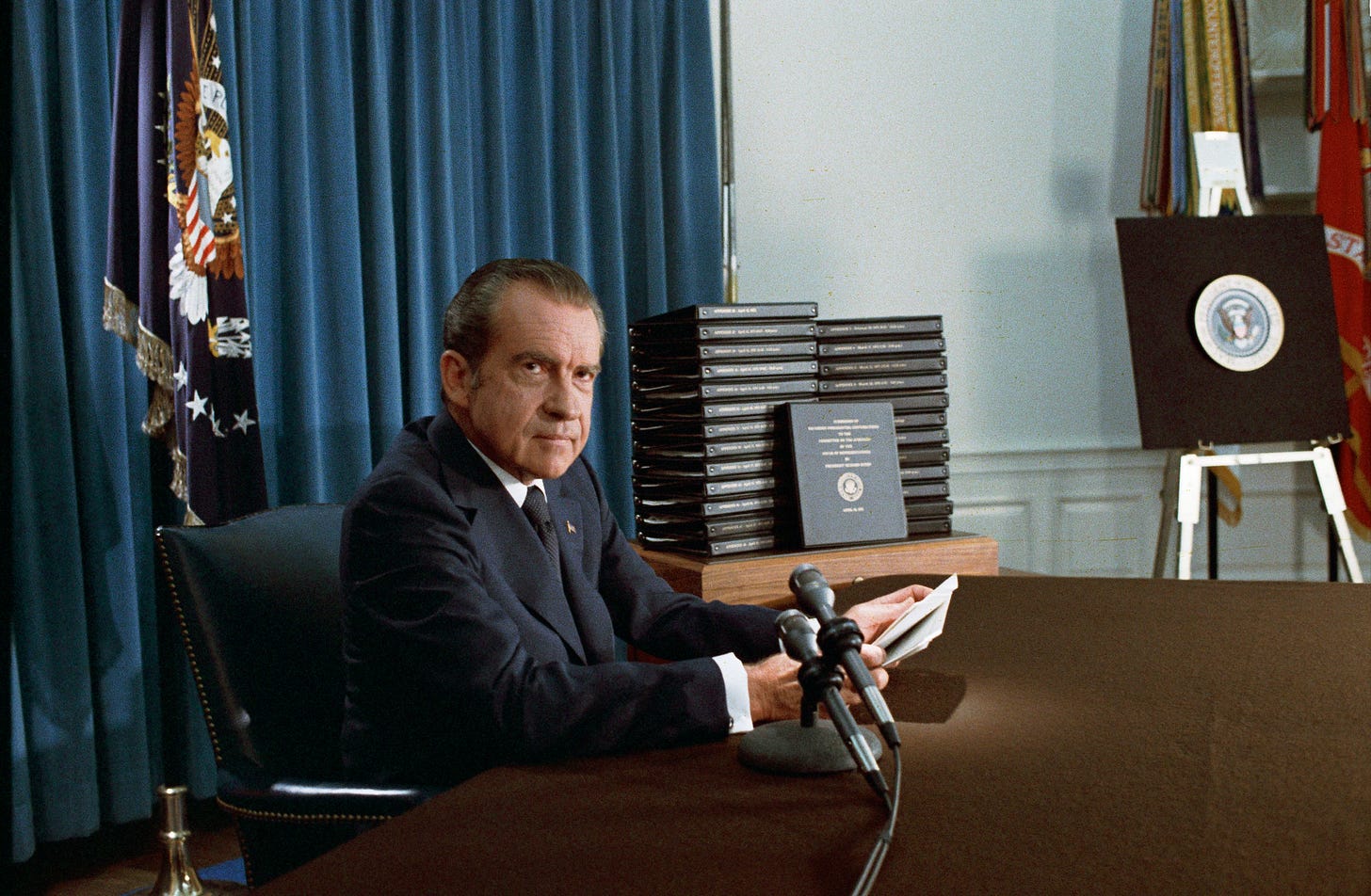John Sirica never shied away from a fight.
He coached boxers three nights a week while in law school, sparred with an ex-welterweight champion and won a match that prompted a local paper to call him a “great little mitt artist.”
Sirica was a loyal Republican who was appointed to a federal judgeship in Washington by President Dwight Eisenhower and rose to become chief judge of his district. Yet when the seven defendants in the break-in to the Watergate office of the Democratic National Committee were coming up for trial, and Republicans were seeking to avoid blame, the 68-year-old judge assigned the case to himself.
The five men caught in the DNC headquarters on June 17, 1972 carried thousands in cash, along with cameras and bugging equipment. Ron Ziegler, press secretary for President Richard M. Nixon, called it a “third-rate burglary” and predicted, “certain elements may try to stretch this beyond what it is.”
Sirica could have let the case fade in public consciousness by accepting guilty pleas from the defendants and handing out routine sentences. But when the trial began in January, 1973, he chose to push relentlessly for the truth about the connections between the burglars and Nixon’s re-election campaign.
Sirica’s approach worked. “Almost single-handedly, with great courage and risk to his reputation, Sirica had broken the case wide open,” historian Rick Perlstein wrote.
The judge was deluged with letters from ordinary Americans praising his actions. But, as his granddaughter Amalia Sirica wrote in January, 2020 for CNN Opinion, the judge revealed that he got five death threats, and his home had to be guarded around the clock. “Violence, or the threat of it, has often been used as a tactic to attempt to silence truth. My grandfather’s experience was no different. But he persisted, likely heartened by the encouragement he was receiving from many Americans.”
Sirica’s example is worth remembering today, at a time when judges around the country are under fire for standing up for the law against power grabs by President Donald Trump’s administration. As Supreme Court Justice Ketanji Brown Jackson told a judicial conference May 1, “Across the nation, judges are facing increased threats of not only physical violence but also professional retaliation, just for doing our jobs…the threats and the harassment are attacks on our democracy—on our system of government. And they ultimately risk undermining our Constitution and the rule of law.”
Trump’s moves against government agencies, immigrants, universities, law firms and businesses dependent on trade have provoked hundreds of lawsuits and led judges throughout the country to pause or scuttle administration initiatives.
In the latest example, the U.S. Court of International Trade ruled Wednesday that Trump had exceeded his authority when he imposed steep tariffs on nations around the world. Other courts have struck down Trump’s use of the 1798 Alien Enemies Act to deport migrants and his executive orders targeting law firms for the clients they’ve represented.
The administration is appealing many of the judges’ rulings to higher courts, and in some cases, to the U.S. Supreme Court.
Meanwhile the pushback from MAGA world has been fierce.
Trump and Vance
When a federal judge sought to pause deportation of migrants to South Sudan, the White House said the judge was a “far-left activist” and Trump blasted, “USA hating judges who suffer from an ideology that is sick, and very dangerous for a country.”
Vice President J.D. Vance has long cautioned judges against blocking a president’s actions. He equated judges’ rulings against Trump’s handling of migrants to “an effort by the courts to quite literally overturn the will of the American people.”
In 2021, he recommended to Trump “when the courts stop you, stand before the country like Andrew Jackson did and say: ‘The chief justice has made his ruling. Now let him enforce it.’ ”
Safety
Citing data from the U.S. Marshals Service, the New York Times reported a sharp increase in threats against judges.
“Increasingly, ex-judges and legal experts warn the verbal attacks by Trump, his attorney general, Pam Bondi, and Maga allies are creating a hostile climate that endangers the safety of judges and their families,” the Guardian wrote.
“The top Democrat on the Senate judiciary committee, Richard Durbin, this month wrote to Bondi and the FBI director, Kash Patel, requesting an investigation into anonymous pizza deliveries to at least a dozen judges that seem aimed at intimidating them as they handle cases involving the administration.
“Durbin’s letter noted some of the pizza deliveries were made in the name of US district judge Esther Salas’s son, Daniel Anderl, who was fatally shot in 2020 by a lawyer who pretended to be a delivery person, according to an April missive from Salas and attorney Paul Kiesel.”
Sirica’s courage
“I came up rough-and-tumble, never backing away from a fight,” Judge Sirica told Time Magazine. “It does something good for you.”
His father left Italy for the U.S., working as a barber while his wife operated a grocery store with the family living in a back room. Sirica’s mother discouraged her son from a boxing career, and he began practicing law, eventually becoming a prosecutor in Washington and later a trial lawyer for a big firm. As a judge, he developed a reputation for toughness and for rulings that were sometimes rejected by higher courts.
“Civil libertarians and conservatives alike attacked some of his methods — his questioning of witnesses, for instance, and especially his threats of heavy sentences to defendants who refused to cooperate with Watergate investigators. Some lawyers mocked him, and rated his judicial talents poorly,” the New York Times wrote.
But after the Watergate burglary, there was a need for a truth-seeker like Sirica. The resulting scandal would show how Nixon, his top advisers and his campaign heedlessly broke the law, in an obsessive preoccupation with secrecy, control and rooting out perceived enemies, as historian Keith W. Olson described in his book Watergate: The Presidential Scandal That Shook America. “In addition to accumulating secret, illegal campaign funds and conducting at least three dirty tricks campaigns, the Nixon reelection operation placed a great emphasis on intelligence gathering.”
The campaign’s operatives broke into the DNC office in the Watergate complex over Memorial Day weekend in 1972, but a tap placed on the phone of DNC chairman Lawrence F. O’Brien Jr. didn’t work. That led to the second burglary, on June 17, which was foiled by an alert security guard and undercover police.
One of those arrested at the Watergate hotel-office complex on June 17, 1972 was James McCord Jr., who was soon revealed to be a security aide for the Committee for the Re-Election of the President (nicknamed CREEP).
In the Washington Post, reporters Carl Bernstein and Bob Woodward quickly demolished the White House’s attempt to cover up the political connections to the crime. On October 10, they reported, “FBI agents have established that the Watergate bugging incident stemmed from a massive campaign of political spying and sabotage conducted on behalf of President Nixon’s re-election and directed by officials of the White House and the Committee for the Re-election of the President.”
“The activities, according to information in FBI and Department of Justice files, were aimed at all the major Democratic presidential contenders and — since 1971 —represented a basic strategy of the Nixon re-election effort.”
That bombshell didn’t stop Nixon from scoring a landslide victory in November against Democrat George McGovern. But the Watergate case continued to move through the court system, and it was Judge Sirica who made sure the trial became a media sensation.
As Rick Perlstein wrote, he “kept badgering defendants and witnesses on matters not covered in the indictment—namely, the financial and institutional involvement of the White House and reelection campaign.”
Seeking a lighter sentence, James McCord wrote the judge a letter revealing, “There was political pressure applied to the defendants to plead guilty and remain silent.” Sirica, known as “Maximum John” for imposing tough sentences, gave the defendants lengthy “provisional” terms but offered eventual leniency if they cooperated with investigators.
Cover-up and retaliation

The president and his top aides went to extraordinary lengths to try to cover up Watergate — burning and shredding documents, making hush money payments, lying repeatedly to the public and the media. Nixon tried to make former Attorney General John Mitchell, who headed CREEP, the fall guy for the burglary. The president’s associates threatened the Washington Post and CBS with retaliation for their reporting — including possibly stripping the Post of a license for a television station it owned.
“Nixon’s campaign to undermine public confidence in The Post was intensifying,” recalled the Post’s publisher Katharine Graham. “The investigation of such a tangled web of crime, money, and mischief was made much harder given the unveiled threats and harassment by a president and his administration. Bearing the full brunt of presidential wrath is always disturbing. Sometimes I wondered if we could survive four more years of this kind of strain.”
While making numerous attempts to distance himself from the Watergate cover-up, Nixon also began invoking executive privilege to shield evidence from the courts and public. But he was undone with the disclosure by aide Alexander Butterfield of a taping system in the White House.
Judge Sirica granted special prosecutor Archibald Cox’s request to subpoena the tapes of some Oval Office discussions.
When Nixon refused to release the full recordings, the case reached the Supreme Court. Chief Justice Warren Burger wrote in an 8-0 ruling in July, 1974 that the president’s “generalized assertion of privilege must yield to the demonstrated, specific need for evidence in a pending criminal trial.”
The cover-up was finally over. On August 9, Nixon became the only U.S. president to resign while in office.
Profiles in courage
When Trump was facing impeachment in 2019 for allegedly twisting U.S. policy on Ukraine for his political benefit, William A. Galston of the Brookings Institution commented on Republican senators wrestling with how to react.
“To the extent that they quietly harbor conscientious objections to what the president is doing — or, even more spectacularly, how he’s doing it — they have to weigh the calling of conscience against political considerations,” Galston told The Washington Post. “There’s a reason why ‘Profiles in Courage’ is a very short book. Courage is not the norm. It’s the exception.”
It’s hard to find profiles in courage among Republicans in Congress during the second Trump administration. But there are many federal judges, including some appointed by Trump, who have presented the last line of defense in the government against actions they’ve found to be unlawful or unconstitutional.
While most media coverage of the judiciary focuses on the Supreme Court, it is first-line judges like John Sirica who have to make the immediate calls.
In 1973, Sirica conceded to an interviewer that he wasn’t an intellectual, by the conventional definition. “A great intellectual doesn't make a great trial judge. A man who's been a trial lawyer is a better judge of human nature than Professor X at Harvard, who's probably never been in the well of a courtroom. I've been a prosecutor, a defense lawyer, a counsel to a very important investigation on the Hill. . . . I'm a realist as opposed to a theorist, you know me.
“Appeals court judges don't have to shoot from the hip. They have the leisure to think, to decide. We have to make decisions in a split second, whether to sustain or overrule an objection...
The judge added, “So Sirica's not an intellectual. Who cares! The important question is whether a judge is honest, and does he have the courage of his convictions to do what is right at the moment.”
The parade of Joe Biden books
Why now? That’s the question a lot of people are asking about the spate of books examining the increasing infirmity of President Joe Biden.









Perfect timing for a solid piece recalling Judge Sirica’s courage. I hope a lot of current judges read it and draw strength from it.